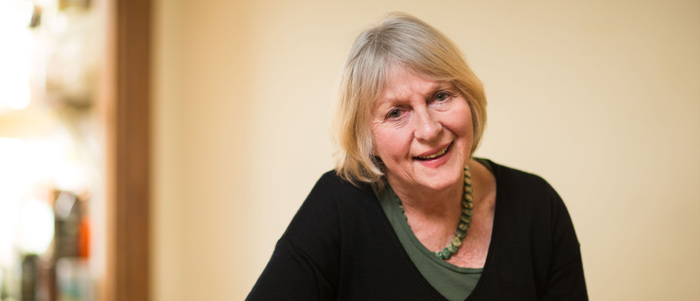Meet Jo – Carer, Sister, Aunt, Mother

Jo is a resilient woman.
As a carer to her sister and nephew, both of whom lived with schizophrenia, and then to her son, who developed clinical depression and bipolar disorder, she has experienced a road full of personal heartache and despair, and while there have been moments on her journey where her resolve has wavered, it has never diminished.
As an ambassador of SANE Australia’s Thriving Communities campaign, which aims to raise awareness of the benefits online support and social connection can have on Australians whose lives are affected by complex mental illness, Jo’s voice is one that demands to be heard. She represents a group of individuals whose efforts to support family and other individuals living with mental illness is severely underestimated.
“Burnout goes hand-in-hand with the job of caring because unlike other means of employment, there are no holidays, no weekends off and the carers’ pension is not great.
“The build-up of sleep deprivation and physical and mental exhaustion spawns feelings of defeat, failure and a loss of self-esteem, self-confidence and self-worth, creating a gradual loss of identity.”
For Jo, the pressure to care for her loved ones, together with the lack of support at the time for services to assist carers, led her to relieve the stress and anxiety of her role by turning to alcohol and later, Valium. The effects of each would only be temporary and the weight on her shoulders would return come the rise of the sun in the morning.
Eventually, she would develop healthier methods of dealing with stress, such as journaling, which she would utilise in the aftermath of her nephew’s suicide at the age of 19 and her sister’s death eight weeks later.
“Writing my feelings and thoughts down on paper – my guilt, grief, depression and anger – definitely helped me to cope.”
One example of an entry in her journal highlights the loneliness and pain Jo experienced during this turbulent time. The following is an excerpt of an entry she wrote on the night of her nephew’s funeral.
“Dear Joel,
Maybe in time I would have been able to communicate with you successfully. Maybe someone would have come up with a cure for schizophrenia. As a child, you slept in my bed with me and I felt so much love for you I thought my heart would burst. You were such an angry little boy at times. No Dad and a Mum who was always sick. It wasn’t fair, was it Joel?
I remember your gentleness with every living creature – rescuing grasshoppers from cats and carefully affixing cobwebs to one side of the garden path each morning so that the spider could retrieve its nightly catch of mosquitoes.
Although I couldn’t cope with your adult rebellion, my heart ached for the frightened little boy hiding in the corners of your living nightmare.
I’ve been given your wallet as a memento, Joel. It contains 15 cents and your health benefits card. These were your worldly possessions.
I don’t know what to do with your wallet. I can’t bear to look at it, yet I can’t dispose of it either. I’ll keep it in the glove box of my car for the time being. Does that seem a strange place to keep it Joel? It is as strange as the place where I keep my feelings hidden. But I don’t know what to do with them either.”
She was put to the test again when her son developed clinical depression and bipolar disorder, and she would became his full-time carer.
While there were no support groups and online forums during Jo’s lowest moments in the 1970s and 1980s, these days she acknowledges there are a number of services and charities carers can access to help them cope with the stress and exhaustion of their roles.

“Carers need to be able to be in contact with professionals who are understanding and compassionate, who can advise and help. But they also need to be in contact with other carers so they can realise they are not alone.
“Its extremely important carers seek support from professionals, carers’ support groups and, if it’s impossible to leave the house, join the wonderful online forums that now exist. SANE Australia has a carers’ forum where you can talk to fellow carers from all over Australia at any time of the day and night, and it is anonymous.”
Passionate about advocating for the support services carers need, Jo also runs workshops across Australia. During these one-day or weekend workshops, she facilitates a safe and supportive space where carers can connect with others who share the same feelings, thoughts and experiences as them. Together with fostering connection, Jo teaches meditation and relaxation exercises, creative writing and journaling – the activities she cultivated to help in her darkest hours.
For Jo, it’s all about balance and making sure that as a carer you look after yourself too.
“It is important to take care of yourself so strive to get enough sleep, if possible, and certainly eat healthily. You need to remind yourself that if you got sick, who would look after your loved one?”
Written by Danielle Hanrahan
Newsletter
Stay up to date
Sign up to our Mind Reader newsletter for monthly mental health news, information and updates.